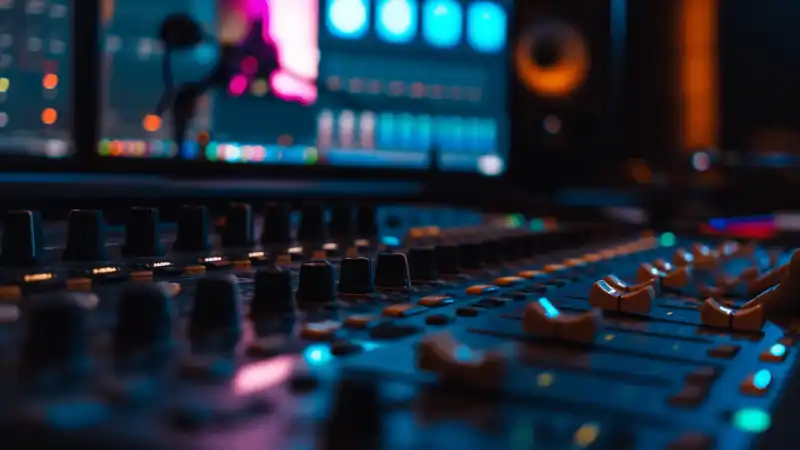Introduction
The music industry has undergone a radical transformation in recent decades, thanks to advancements in technology. From vinyl records to streaming platforms, technology has reshaped the way music is created, distributed, and consumed. Musicians now have access to powerful tools for producing and sharing their work, while listeners enjoy unprecedented convenience and variety. In this article, we will explore how technology is revolutionizing the music industry, touching on production, distribution, marketing, and the impact on artists and consumers.

The Evolution of Music Production
Digital Recording and Editing
Gone are the days when musicians relied solely on analog recording techniques. Digital recording technology has made music production more accessible and efficient. Software like Pro Tools, Ableton Live, and FL Studio allows artists to record, edit, and mix music with precision and ease. These digital audio workstations (DAWs) have eliminated the need for expensive studio sessions, enabling independent artists to produce high-quality music from home.
Artificial Intelligence and Music Creation
Artificial intelligence (AI) is making waves in the music industry by generating melodies, lyrics, and even entire compositions. AI-powered platforms like AIVA and Amper Music help artists create music based on specific styles or moods. While some purists argue that AI cannot replace human creativity, it is undoubtedly a valuable tool for composers and producers looking for inspiration or assistance in the creative process.
Virtual Instruments and Sampling
Technology has expanded the range of sounds available to musicians through virtual instruments and sampling. Synthesizers, drum machines, and software-based orchestras enable artists to experiment with diverse soundscapes without hiring an entire band or orchestra. This has been particularly beneficial for genres like electronic music, where digital production dominates.
Get ready for an electrifying musical experience! 🚀 Dive into the unique beats and captivating melodies of Ludo Loco on SoundCloud. Whether you’re a fan of deep rhythms, vibrant energy, or fresh, innovative sounds, this track is guaranteed to move you. Don’t miss out—click below and let the music take over! 🎧🔥
The Shift in Music Distribution
Streaming Services Revolution
The rise of Spotify, Apple Music, and YouTube Music has revolutionized music distribution. Unlike traditional CDs or digital downloads, streaming platforms offer unlimited access to vast libraries of music for a monthly subscription or free with ads. This shift has changed how artists release music, prioritizing singles and frequent releases over traditional album cycles.
Direct-to-Fan Platforms
Artists now have more control over their music distribution through direct-to-fan platforms like Bandcamp, SoundCloud, and Patreon. These services allow musicians to sell music directly to their audience, bypassing record labels and streaming services. This empowers independent artists to build sustainable careers without relying on major industry players.
NFTs and Blockchain in Music
Blockchain technology and Non-Fungible Tokens (NFTs) are emerging as game-changers in music ownership and royalties. Artists can sell unique digital assets, such as exclusive songs, artwork, or concert tickets, as NFTs. Blockchain ensures transparency and fair compensation, reducing disputes over music rights and revenue sharing.
The Impact on Artist Promotion and Marketing
Social Media and Viral Trends
Social media platforms like TikTok, Instagram, and Twitter have become essential marketing tools for musicians. Viral challenges, short-form videos, and fan engagement drive song popularity. Artists no longer need massive marketing budgets to gain recognition—one viral clip can launch a career overnight.
Data-Driven Marketing
With the help of analytics tools and AI-driven insights, musicians can tailor their promotional strategies based on audience preferences. Platforms like Spotify for Artists and YouTube Analytics provide valuable data on listener demographics, locations, and engagement, helping artists refine their outreach efforts.
Live Streaming and Virtual Concerts
Live streaming has transformed the concert experience, especially during the COVID-19 pandemic. Artists can now perform live on platforms like Twitch, Facebook Live, and YouTube, reaching global audiences without the logistical challenges of traditional tours. Virtual reality (VR) concerts are also gaining traction, offering immersive experiences for fans worldwide.
Challenges and Concerns in the Digital Music Era
Fair Compensation and Royalties
While streaming services have made music more accessible, they have also raised concerns about fair artist compensation. Many musicians argue that streaming payouts are insufficient, prompting discussions on more equitable revenue models. Some artists are exploring alternative revenue streams, such as merchandise, crowdfunding, and NFTs to supplement their income.
Music Piracy and Copyright Issues
Although streaming has reduced music piracy, illegal downloads and unauthorized sharing still pose challenges. Blockchain technology is being explored as a potential solution to copyright protection and transparent royalty distribution.
The Impact on Musical Authenticity
As AI-generated music and digital production tools become more advanced, some critics worry about the loss of human authenticity in music. While technology enables new creative possibilities, it also raises questions about the future of traditional musicianship and originality.
The Future of Music and Technology
Looking ahead, the music industry will continue to evolve as technology advances. Some exciting trends to watch include:
- AI-Enhanced Music Creation: More sophisticated AI tools will assist artists in songwriting, mixing, and mastering.
- 5G and Faster Streaming: Improved internet speeds will enhance real-time collaboration and high-fidelity music streaming.
- Augmented Reality (AR) and Virtual Reality (VR) Experiences: Interactive music experiences will become more immersive, changing how fans engage with artists.
- Decentralized Music Platforms: Blockchain-based music platforms may offer better revenue-sharing models for independent musicians.
Conclusion
Technology has undeniably transformed the music industry, reshaping how music is produced, distributed, and consumed. While these advancements offer exciting opportunities for artists and listeners alike, they also present challenges that must be addressed. As we move forward, finding a balance between innovation and artistic integrity will be crucial in ensuring a thriving and sustainable music industry. Whether you’re an artist, producer, or fan, embracing these changes can open new doors to creativity and engagement in the ever-evolving world of music.
By adapting to technological advancements, musicians and industry professionals can harness the power of innovation to create, share, and enjoy music in unprecedented ways. The future of music is digital, dynamic, and full of endless possibilities.